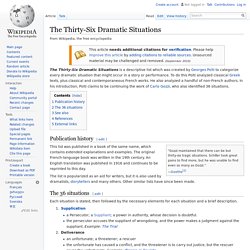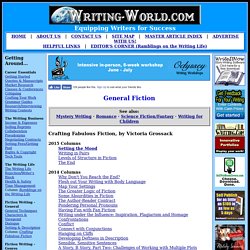

Phrase Thesaurus - ideas generator for writers. The Thirty-Six Dramatic Situations. The Thirty-Six Dramatic Situations is a descriptive list which was created by Georges Polti to categorize every dramatic situation that might occur in a story or performance.

To do this Polti analyzed classical Greek texts, plus classical and contemporaneous French works. He also analyzed a handful of non-French authors. In his introduction, Polti claims to be continuing the work of Carlo Gozzi, who also identified 36 situations. Publication history[edit] “Gozzi maintained that there can be but thirty-six tragic situations.
This list was published in a book of the same name, which contains extended explanations and examples. The list is popularized as an aid for writers, but it is also used by dramatists, storytellers and many others. The 36 situations[edit] Each situation is stated, then followed by the necessary elements for each situation and a brief description. See also[edit] References[edit] External links[edit] 25 Things Every Writer Should Know. An alternate title for this post might be, “Things I Think About Writing,” which is to say, these are random snidbits (snippets + tidbits) of beliefs I hold about what it takes to be a writer.

I hesitate to say that any of this is exactly Zen (oh how often we as a culture misuse the term “Zen” — like, “Whoa, that tapestry is so cool, it’s really Zen“), but it certainly favors a sharper, shorter style than the blathering wordsplosions I tend to rely on in my day-to-day writing posts. Anyway. Peruse these. Absorb them into your body. Let your colonic flora digest them and feed them through your bloodstream to the little goblin-man that pilots you. Feel free to disagree with any of these; these are not immutable laws. Buckle up. 1. The Internet is 55% porn, and 45% writers. 2. A lot of writers try to skip over the basics and leap fully-formed out of their own head-wombs. 3. 4. I have been writing professionally for a lucky-despite-the-number 13 years. 5. Luck matters. 6. General Fiction. Getting Around...

Career Essentials Getting Started Queries & Manuscripts Market Research Classes & Conferences Critiquing Crafting Your Work Grammar Guides Research/Interviewing Writing Contests The Writing Business Income & Expenses Selling Reprints Collaboration Pseudonyms Negotiating Contracts Setting Fees/Getting Paid Rights & Copyright Tech Tools The Writing Life The Writing Life Rejection/Writer's Block Health & Safety Time ManagementColumn: Ramblings on the Writing Life Fiction Writing - General General Techniques Characters & Viewpoint Dialogue Setting & DescriptionColumn: Crafting Fabulous Fiction Fiction Writing - Genres Children's Writing Mystery Writing Romance Writing SF, Fantasy & Horror Flash Fiction & More Nonfiction Writing General Freelancing Columns & Syndication Newspapers/Journalism Topical Markets Travel Writing Photography Creative Nonfiction Memoirs/Biography International Freelancing Business/Tech Writing Other Topics Poetry & Greeting Cards Screenwriting.
» 9 Ways to Find the Time to Write. Eight Secrets Which Writers Won’t Tell You. Image from Flickr by Lazurite This is not particularly relevant to the post, but I’m getting an awful lot of comments telling me, often a little snarkily, “it’s ‘THAT’ not ‘WHICH’”.

The “don’t use which for restrictive clauses” rule comes (as far as I can tell) from Strunk and White. Plenty of authors, including Austen, have used “which” exactly as I use it in the title. It’s very commonly used like this here in England, so I’m guessing my comments are coming from US readers. There was never a period in the history of English when “which” at the beginning of a restrictive relative clause was an error. I thought about putting “that” in the title – but I like the sound of “which” between “secrets” and “writers”.
And with that out of the way, enjoy the post! A few years ago, I’d look at published writers and think that they were somehow different from me. They were real writers. I’m going to go through eight secrets. Secret #1: Writing is Hard The truth is, though, that writing is hard.